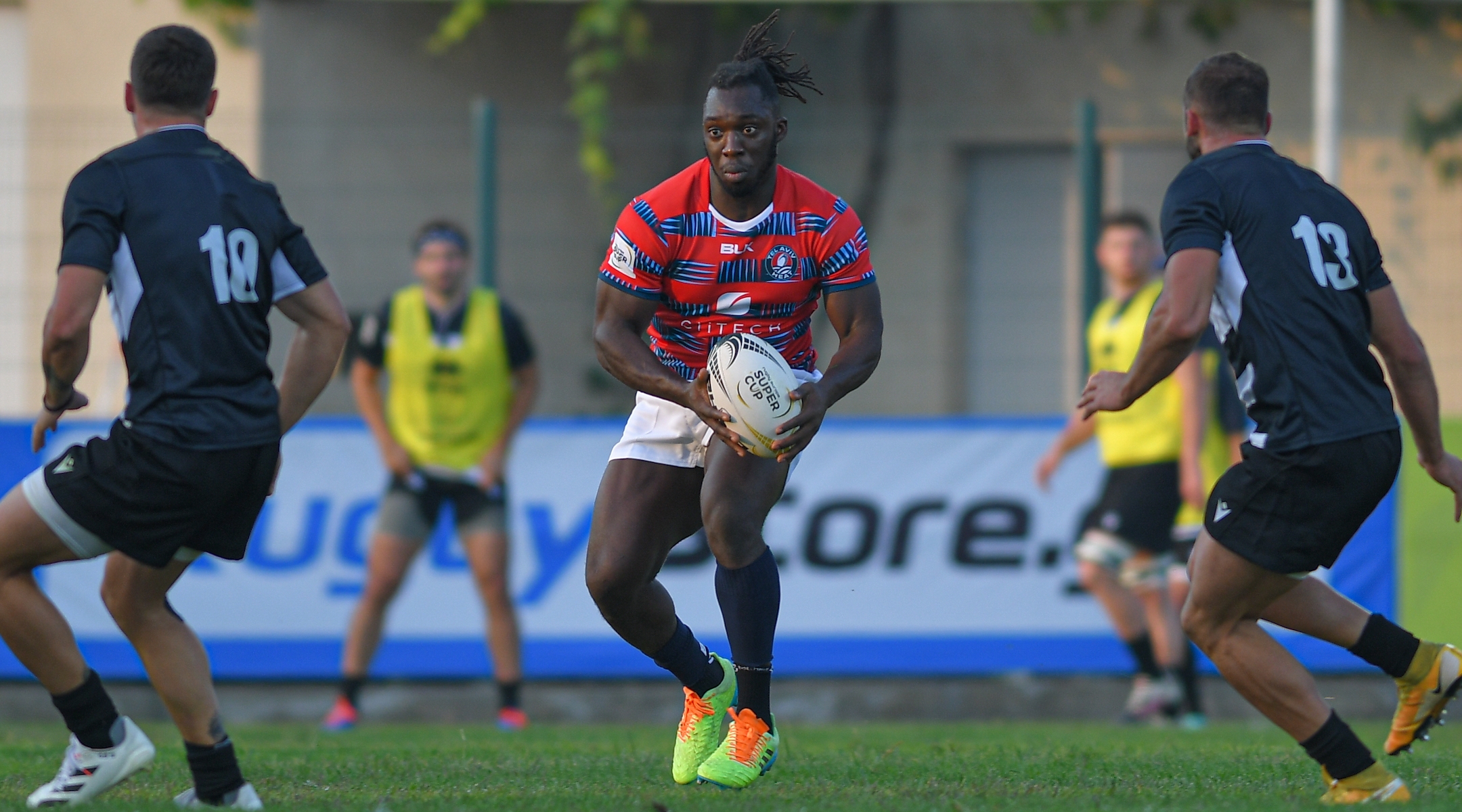Rugby’s governing body ruled that South Africa’s exclusion of Israel was not discrimination. The Israeli team is skeptical.
World Rugby concluded that the decision to disinvite an Israeli team from an international tournament was made due to security concerns

Gabriel Ibitoye of the Tel-Aviv Heat during the Rugby Europe Super Cup on Oct. 16, 2021 in Tbilisi, Georgia. (Levan Verdzeuli/Getty Images)
(JTA) — Rugby’s global governing body has determined that the South African Rugby Union’s decision to disinvite an Israeli team from an international competition last month was not discriminatory.
But the CEO of the Israeli team isn’t buying the argument that the cancelation had to do with security threats, as South Africa argued and World Rugby concluded.
“We expected World Rugby to take a closer look at the events leading up to the withdrawal of the invitation,” Tel Aviv Heat CEO Pete Sickle told JTA. “We still have not seen tangible evidence of credible and significant threats to public safety. We haven’t seen any evidence of SARU or South African security forces analyzing those threats before making this decision.”
The inquiry by the governing body followed South Africa Rugby’s announcement Feb. 3 that the Tel Aviv Heat team was no longer invited to a March 24 competition. The decision came after pressure from the South African BDS Coalition, an affiliate of the Palestinian BDS National Committee that promotes the boycott, divestment and sanctions movement against Israel.
At the time, South Africa Rugby’s CEO said that after listening to “the opinions of important stakeholder groups,” the decision had been made to disinvite Tel Aviv “to avoid the likelihood of the competition becoming a source of division, notwithstanding the fact that Israel is a full member of World Rugby.”
In response, major Jewish groups, led by the Louis D. Brandeis Center for Human Rights, urged the U.S. team that was tapped to replace the Heat to withdraw from the tournament. The San Clemente Rhinos put out a statement condemning discrimination and saying the team “stands together with Tel Aviv Heat players and coaches” but did not withdraw.
Then, shortly after the tournament, following an investigation into the Israel Rugby Union’s charges of discrimination, World Rugby ruled that the decision had instead been made due to threats of violence, according to a letter obtained by the Jewish Telegraphic Agency.
In the letter, World Rugby pointed to the public reaction of inviting an Israeli team to South Africa in the first place — including a single Facebook post warning of a “blood bath” at the tournament, and a statement by the BDS coalition claiming that the South Africa Rugby Union would “have blood on its hands” if the Heat participated.
“World Rugby is satisfied with the explanation provided by SA Rugby that the decision to withdraw the invitation to Tel Aviv Heat to participate in the Mzansi Challenge was based on concerns about an increased safety and security threat including the potential threats of violence, disruption and risks to the safety of stakeholders, together with concerns about the ability of SA Rugby to meet its obligations as an event organiser under the Safety at Sports and Recreational Events Act,” reads the letter, which is dated March 29.
South Africa’s department of sports, arts and culture had also released a brief statement in February supporting the decision to disinvite Israel, “to ensure a safe environment” at the tournament.
Jewish groups in South Africa have criticized World Rugby’s ruling, according to the South African Jewish Report.
A spokesperson for South African Friends of Israel said the South Africa Rugby Union “bent the knee to appease political extremists in South Africa who threatened to harm and incite violence should an Israeli team participate in the sport.”
Benji Shulman, the director of public policy at the South African Zionist Federation, called the decision “an attack on our sportsmen and women in South Africa.”
“World Rugby has now confirmed the threats of violence posed by political extremists — in this case, being the antisemitic BDS movement,” he said.
Sickle said the team and Israel Rugby made multiple requests to see evidence of significant public safety risks but did not receive a satisfactory response. “We remain unconvinced, due to a lack of specific evidence, that safety and security was the overriding factor in withdrawing the invitation,” he added.
Sickle said he can appreciate the security implications of hosting an international sports competition. Since SARU and World Rugby determined that safety was a concern, he and his team would “look forward to using the next year to work with SARU” and with local authorities to make the necessary arrangements to ensure that safety is not a concern for his team’s participation in next year’s tournament.
This article originally appeared on JTA.org.















